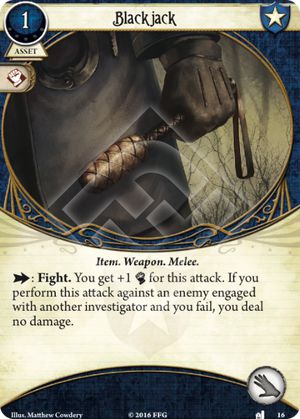
Normally I think of Enchanted Blade as a weapon designed for guardians, since the additional cost of an arcane slot means nothing to them but is very painful for mystics. But since this version of the weapon can only be taken by mystics, I thought it was an interesting exercise to compare it to a spell instead, Shriveling (3) in particular, which has the same resource and XP cost, and compared to spending one charge on the blade, is the same number of uses for the same damage.
To make this comparison directly you have to pin down the relative willpower and combat ability of the mystic. I feel that a mystic whose combat is only two points below their willpower (for instance, Jim Culver with St. Hubert’s Key, or Akachi without a willpower bonus) is a relatively muscular Mystic who would be a good candidate to wield a blade, so I made the following comparisons assuming combat equals willpower minus 2:
Advantages of Enchanted Blade:
- Allows you to spend two charges on a single attack for double the bonus. This is a huge advantage since it is actually very efficient to do so when fighting an enemy where the extra damage is useful.
- Enchanted Blade can be used without spending charges, and is equal in combat ability to the Sword Cane for this purpose, without having to spend the extra card and resources to play the Sword Cane, and without the limitation of having to exhaust it.
- Enchanted Blade does not have the risk of causing horror damage.
Advantages of Shriveling:
- Compared to using the Enchanted Blade and only spending a single charge, Shriveling gives you +1 fight ability.
- A Mystic is likely to have lots more ways to commit cards with willpower bonuses or otherwise boost willpower, fewer ways to commit cards with combat bonuses or otherwise do anything to boost the fight ability on Enchanted Blade.
- This card can be upgraded to Shriveling (5), which is a very impressive upgrade and is much better than the blade if you frequently fight foes with 3 health or with 5+ health.
- Some decks may find it helpful that this is a spell rather than an item (such as a deck using Arcane Initiate).
- Does not require a hand slot. If you use your hand to hold a Sword Cane, you can use it to evade, which Enchanted Blade cannot do. Or you have the option of holding something else in that hand.
- In order to keep using the Enchanted Blade’s ability to fight without charges, you have to keep it in play eating up a spell slot. If you play Shriveling and Sword Cane instead, you can replace the Shriveling with a new spell once you run out of charges, and the Sword Cane will stay in play.
After doing the comparison, I felt the Enchanted Blade is more impressive than I first thought. I don't think either the blade or the spell clearly wins the comparison, it depends on the character, but the blade looks like a perfectly reasonable choice for the deck of a Mystic with good combat ability, despite costing a spell slot.



